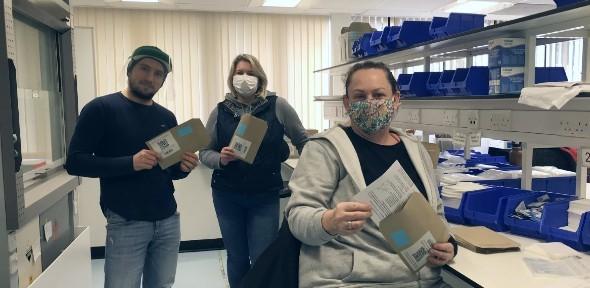
Connecting staff who currently have spare capacity with opportunities in other departments
It made a huge difference to us that we were able to find staff within the University who had exactly the skill set we needed.
Darius Danaei, production manager for the asymptomatic testing programme
The pandemic has had a distinctly uneven effect on workloads across the University. Some people and institutions are contending with much more work than before, in some cases including whole new areas such as centralised procurement and distribution of PPE. Other areas of work, such as catering, have either stopped completely or been significantly reduced, and many staff from these departments are furloughed or working reduced hours.
The Skills Exchange scheme is a simple concept that makes it easy for institutions that need extra help to find people who currently have spare capacity (and vice versa). Opportunities are posted by host institutions on a MS Teams site (you will need to be logged into Microsoft 365), and individuals can browse these opportunities and apply for any that they are interested in, as long as they have their home line manager’s support. The process involves minimal administration and is designed to facilitate quick and easy connecting of people with opportunities.
Case studies
Several departments across the University have already used skills exchanges to bring in extra help when they needed it, and by doing so have provided staff who are furloughed (or otherwise have extra capacity) with the opportunity to do interesting work, enhance existing skills or develop new ones, and make contacts in other parts of the University. The host departments benefit not just from the extra help but from the skills and knowledge of the University that these staff bring.
From packing sandwiches to packing swabs: catering staff at the asymptomatic student screening programme
In September, the University’s unique asymptomatic testing scheme had to set up a production line from scratch to pack the thousands of COVID test kits needed to test students every week. Several catering staff from the University’s central production kitchen voluntarily came back from furlough to work on the packing line (main picture, above).
Darius Danaei, production manager for the testing programme, says: “It made a huge difference to us that we were able to find staff within the University who had exactly the skill set we needed. Because of them, we were able to regularly exceed our production targets, and they also contributed to process improvements on the line."
Karen Gibbs, from the University Catering Service, has found her time in a different role extremely positive. She says: “I’ve always worked in catering, but actually this has helped me to see that the skills I’ve got are relevant in other areas. Sitting at home doing nothing does get to you after a while: this was a way of doing something useful and getting out of the house.”
Nick White, Karen’s manager at the University Catering Service, says: “I was thrilled when my colleagues volunteered for the production line. I know that they have really benefited from the experience, learning valuable new skills, which has been great for their confidence and their personal development.”
Learning new software skills in Estates Division: from manning a reception desk to updating an intranet
Kate Morgan is a receptionist at the University Centre, which has been closed since last March. Since August she has been helping the Compliance team in Estates Division, who were implementing a new document storage solution. Kate had never used the software before, but with training from her new team members, she mastered it and made a significant contribution to the project.
The host team is so happy with her work that she has now been asked to help with another project, updating the information on the Division’s intranet – which will entail learning more new software, as well as communication and web skills.
Kate says: “I feel reassured that I have got these new skills and have been able to demonstrate my ability to work in a different team and a different environment, because there’s so much uncertainty around the catering and hospitality industry at the moment. It’s so nice to be meeting new people and speaking to colleagues every day because I'm used to being in a busy and social role on a reception desk.”
Building connections between the Department of Engineering and the central HR division
Lotta Kallioinen has been supporting the School of Technology HR School team on a part-time basis since October 2020, alongside her usual duties as HR Advisor in the Department of Engineering. The HR division has benefited from Lotta’s support – citing her work as “invaluable” – and her departmental knowledge, and in turn Lotta has been able to get involved with aspects of HR that she would not encounter in her day-to-day role.
Lotta says: “Doing this placement has been really motivational: it has broadened my understanding of the work we do and the different aspects of HR, which I hope will help with my career development.”
Professor Richard Prager, Head of the Department of Engineering, says: “It is advantageous to share skills between departments and central HR: our staff gain new skills and it helps to average out uneven variations in load across activities.”
